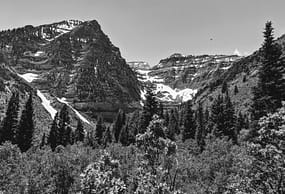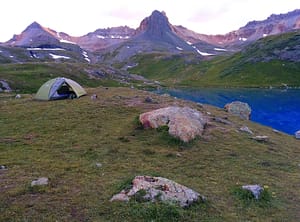Getaway
by Brian
 I rented a car for the weekend and drove into the mountains.
I rented a car for the weekend and drove into the mountains.
Lately, the city had been getting to me, even more than usual. In the nearly ten years I’d lived there, the city had grown and changed beyond recognition. The growth possessed a purpose of its own, one that the city’s people were a means to.
Nobody was in control. That much I knew.
Snow clung to the mountain’s highest reaches, though it was well into July. The mountains were a reminder of the pre-human past. The city was a portent of the post-human future.
The pieces of individual lives, individual structures, individual cities, were becoming wholly interchangeable.
Thousands of people had the exact same idea as me. We moved slowly in bad traffic between our future and our past along a stretch of tarmac. Road construction caused delays. The smell of fresh hot pavement was surprisingly inspiring.
I sat in the idling rental, a Hyundai Santa Fe, listening to talk radio. The car’s interior mirrored the city: hopelessly utilitarian. I drank a sparkling water and felt revulsion with the world. There was no escape from the hell we’d created. What’s more, we deserved every bit of it.
I drove down the main drag to the hotel. The town had the feeling of a resort. Couples and families walked together, looking more or less content with their lots. A young boy dropped his ice cream cone on the sidewalk. The family dog voraciously devoured it as the boy stomped and wailed. I closed the windows and turned on the air-conditioning and accepted the pneumatic bliss of the vehicle’s interior.
The hotel, built in a faux-Bavarian style, had nearly the same layout and floorplan as my condominium building. The pieces of individual lives, individual structures, individual cities, were becoming wholly interchangeable. Everything was modular, substitutable, able to be disassembled, moved, and reassembled as needed. Arguably the only thing that differentiated one modern man from another was his own distinct brand of unhappiness.
The liquid plasma television provided an in-room entertainment guide. Brewery tour—that sounded to my liking. The thought of walking the streets with the others was ghastly. They had vicious faces and cruel eyes. Alcohol made their presence tolerable, at least.
Brewery tasting tours were offered on the hour. We were guided through the heart of the facility, past machinery that blinked, hummed, and bubbled. Our guide wore a trucker hat and had a long beard.
“Today, we continue to brew a Kolsch very similar to the one first made here by German immigrants starting in 1874,” he said. “We also proudly brew eight full-time beers, in addition to four rotating taps. Currently, we’re offering limited edition pale ale, stout, imperial IPA, and a seasonal rose hip sour.”
He went on at length about different types of hops, barley, malt, the fermentation process, and so on. At the conclusion of a grueling hour we reached the tasting room. I sampled each of the twelve beers on offer, some of them more than once, and began to feel quite drunk.
I walked the city’s streets with a good buzz-on until I reached the railroad tracks. A kiosk sold rides on a historic, coal-fired railroad that climbed up to above 11,000 feet in elevation. I bought a ticket for the train departing in one hour.
The train lurched and clattered along the narrow gauge tracks, its smoke stack spewing out dark clouds. I sat next to an Indian man who snapped photos with alacrity. We passed a section of recent forest fire, black and dead. I imagined the train on these same tracks a century earlier transporting ore down from the mountains. Nothing had changed; everything had changed.
I wished to sink into humanity’s past, to walk into the wilderness and never return.
Walking down the aisle to the dining car through the coarsely-swaying train was a challenge. I ended up drinking Jack and Cokes with a Texan named Pete.
“Ain’t it beautiful?” he said as the train climbed noisily along the edge of a canyon that looked down on a rushing river.
Maybe it was the drinks, but I began to feel a surge of sentimentality towards the wilderness.
“We shouldn’t be here,” I blurted out. Pete looked at me, puzzled, and fell in with a group of drinkers in the adjacent open-air car.
The white-capped peaks were close now. I observed the character of their crags and couloirs and cracks. At a remote stop in the heart of the mountains a lone passenger got off carrying a large backpack and wearing hiking gear. Passengers waved to him as the train continued on, its whistle punctuating his impending solitude.
I wished I was going with him. I wished to sink into humanity’s past, to walk into the wilderness and never return.
The train arrived back in town shortly past sundown. I ordered takeout and took the food back to my room. I ate messily from the container lying in bed in front of the plasma screen. I watched a high definition nature program about forest ecosystems. The clarity was better than real life. I remembered the lone backpacker out there in the wilderness and wished again that I was there with him.
The backpacker was lying in his one-man tent, atop a Therm-a-Rest mattress that crinkled incessantly each time he moved. Unable to sleep, he switched on his lamp, suspended from the ceiling by a fabric hook, and the tent glowed like a tadpole with a candle inside of it.
The man slipped on his hiking boots and stepped out beyond the threshold to urinate. He found the Milky Way to be rather disappointing compared to those time-elapsed photos of the galaxy.
Why did primitive man invent technology? Because he was bored. He was tired of watching the same celestial public access channel, presented without commercial interruption by the Lord above, each and every night.
The man pissed on his boot as the stream cut out and he cursed in the dark. Something moved. He directed his flashlight and saw a fat porcupine waddling in the grass near the creek. An absurd animal, the porcupine. An animal that served no purpose and painfully defended itself in order to live another day in absurdity.
The man let the final drops of piss dribble out and stood sighing over the rustle of the porcupine. Behind him, the illuminated fabric tadpole radiated greenish turquoise, by far more impressive than Sirius, or Orion, or Alpha Centauri.
He had done it. He had “escaped civilization.”
But now what?
